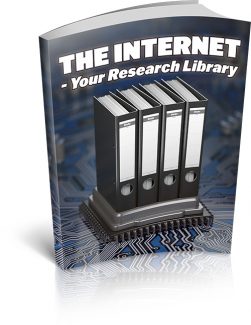 License Type: Master Resell Rights
License Type: Master Resell Rights  File Type: ZIP
File Type: ZIP
 SKU: 63087
SKU: 63087  Shipping: Online Download
Shipping: Online Download
Sample Content Preview
THE INTERNET: RESEARCH LIBRARY AT YOUR COMPUTER FINGER TIPS
Many people who are now comfortable using the Internet remember very different experiences before the computer became a staple in the home. When doing research, it meant spending hours at the library. You could either find books or periodicals on the shelves or submit a special request to access special files and records stored under lock and key. If you needed to look up something that the library did not have on hand, then it was possible to ask the librarian to do some research for you. The library has been relying on computers for years before people had their own personal computers.
Things have sure changed! You can now do an astonishing amount of online research by using a variety of search techniques explained in this report. Not only is a world of information available online, you can access the same information the librarian used to obtain for you many years ago. You can read websites, log into library sites around the world, obtain research articles and reports, and generally obtain a wealth of information on every topic under the sun.
Research, by the way, is not something only students find useful. Everyone needs to do research at some point in his/her life even if he or she is not a student. Homeowners may need to research how to shop for insurance or new appliances. Senior citizens might need to research the newest Medicare regulations and determine how they will impact health coverage. Businesses do research to define competition, markets, and meet product and service research and development needs. Of course, the student is still out there writing research papers and theses or trying to find the best science project for a class project that will net him or her an “A+” as a grade.
This report will tell you how to access much of the various kinds of information available on the Internet. You will learn how to identify information resources and then search the Web in pursuit of information and statistics that meet your needs. By using a methodical approach for online research, you will be able to easily access the appropriate sources for research. In other words, with your computer and Internet access, you have a personal research library right in your home or office. You don’t have to trudge down to the library except on rare occasions.
In the following sections, you will learn how to use your Internet as a research library. It will review how to access the Web, the kinds of research information available, and how to do an efficient search. It’s a great world when you can sit in the comfort of your home and have a world of information at your computer fingertips!
DOT--WHAT?
There you sit with the keyboard under your fingers and a topic you want to research. You type in a keyword or question reflecting the information you need and thousands of results are listed. Studies have shown that many people never go more than three pages deep into the initial search results. Even if true, that does not automatically mean that what you see on your screen is what you really need in order to do the right research.
The vastness of the Internet can be overwhelming. But its very vastness is what makes it such a powerful research tool. You can literally browse the Web and find information posted from around the world. The information can be accessed directly by reading websites not requiring access permission or by joining organizations that maintain online records. Chances are that your local library is one of those sites. Your library card will often give you the right to log into the library’s website and access online catalogues, articles, and research reports.
But here is the great news. If your local library doesn’t have a site or doesn’t have the information you need, you can access government information sites, university websites, articles written by credible individuals, or a number of other online sources. The power of the Internet to provide the research information you need is unlimited if you know how to go about finding the useful and reliable sources.
A report on using the Internet for research would not be complete without discussing the need to evaluate information as to its credibility. One of the drawbacks to the Internet, which can be overcome, is the fact that anyone can post information without regard as to whether it is true or not. So you want to find those sources you can rely on for accuracy and develop the skill to verify information as to its credibility.
The first thing to understand when doing Internet Research is recognizing the URL, which is the extension in the Internet address domain name. When you do an inquiry using a search engine, a variety of sites will be listed in the results pages. Looking at the extension can often help you zero in on the kinds of sites you wish to access.
.net – indicates personal websites developed by individuals
.com – indicates businesses selling goods or services
.org – indicates a non-profit organization
.gov – indicates a government site
.edu – indicates an educational institution
In the beginning, anyone developing an Internet website probably had a .net extension, which led to the .com used for businesses. But it is clear that those simple days are over as the Internet has grown to become a
vast storehouse of information for individuals, businesses, agencies, institutions, governments, and charities. They all have something to tell you, and it is your job to narrow your search to those particular sites that will provide the information you want and need.
CHOOSING THE ENGINE TO DRIVE YOUR TO DRIVE YOUR RESEARCHRESEARCH
The complexity of the Internet is no more apparent than in the variety of Internet search engines now available. The search engine is what goes out on the Web and looks for the sites that match your query. Each search engine uses keywords as the basis for doing a Web search. Some sites are geared more towards personal research, while others, like Google Scholar, search for peer-reviewed scholarly materials.
SEARCH ENGINES THAT DRIVE YOUR QUERY
Following is a list of some of the more popular search engines available for doing online research.
- About.com
- Ask Jeeves
- Dogpile
- Exalead
- Excite
- Google Scholar
- Google
- Hotbot
- Infomine
- Metacrawler
- Public Record Search System
- Scirus
- Yahoo
In addition to these sites, there is an index site found at http://lii.org/, called the Librarians’ Internet Index, that provides easy access to a number of websites sorted by categories such as business, government, media, and reference.
Clearly there are a number of search engines you can use. Some, such as Yahoo and Dogpile, are geared towards the everyday user. Others are designed to find scholarly, peer-reviewed websites that can be used in formal research documents and papers. Peer-reviewed information is that which has been reviewed by recognized experts in the field and approved by them as reliable and truthful.








